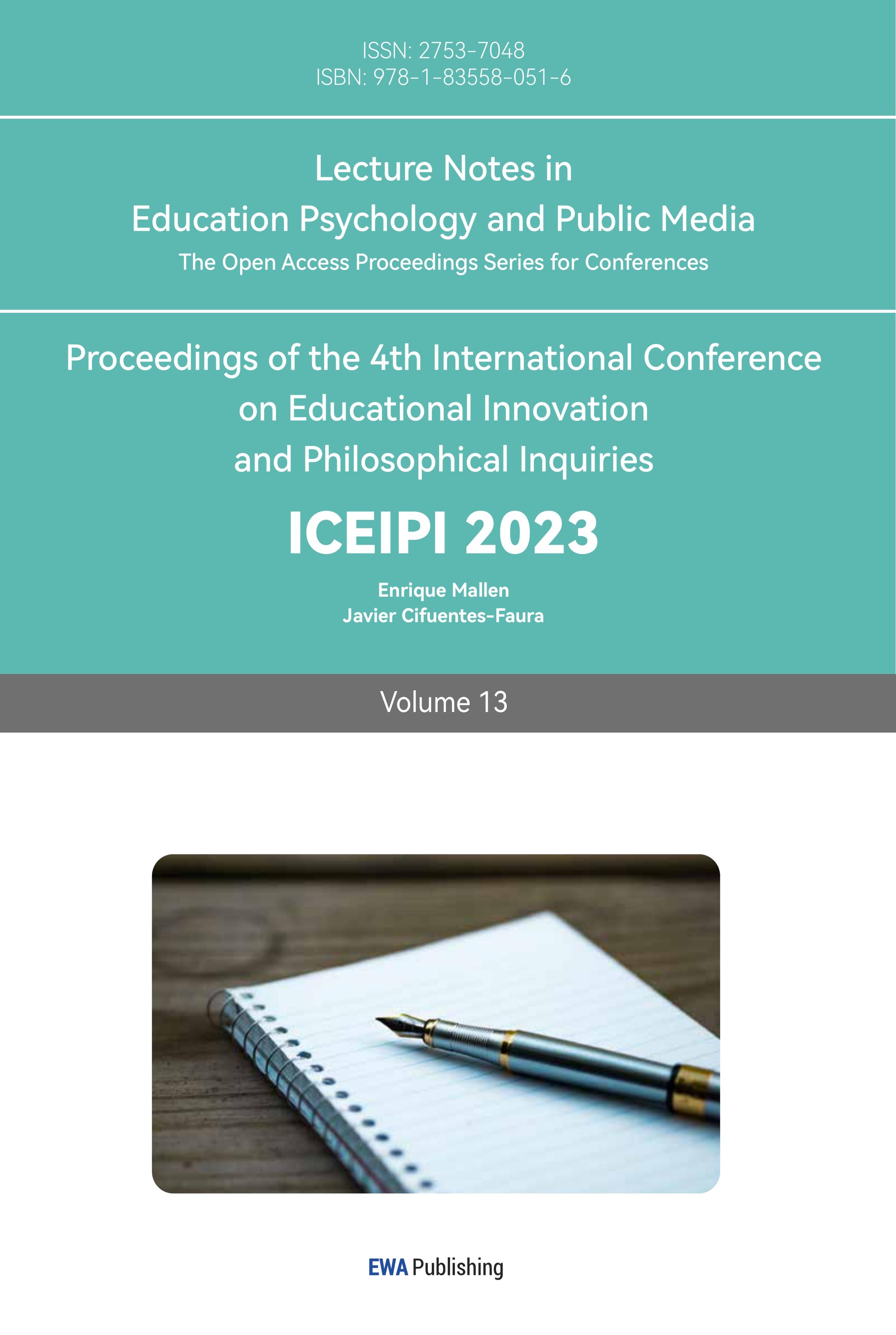References
[1]. Clay V., König P., König S. (2019) Eye Tracking in Virtual Reality. [J] Eye Mov Res. Apr 5;12(1). doi: 10.16910/jemr.12.1.3. PMID: 33828721; PMCID: PMC7903250.
[2]. Sam Kavanagh, Andrew Luxton-Reilly, Burkhard Wuensche. (2017) [A] systematic review of Virtual Reality in education. Themes in Science & Technology Education, 10(2), pp.85-119.
[3]. Xiaohong Ling. (2022) Research on the application of virtual reality technology in education and teaching practice. [C] China Academic Journal Electronic Publishing House, pp.2659-2663.
[4]. Xun Feng. (2007) Application and prospect of virtual reality technology in education. [C] China Academic Journal Electronic Publishing House, pp. 118-123.
[5]. Classen, C. (1997). Foundations for an anthropology of the senses. [J] International Social Science Journal, 49(153),401-412.
[6]. Yajun Ding, Zhiguo Ying, Yimin Chen. (2022) Online and offline hybrid teaching based on augmented reality.Research and development of learning systems [J] Computer Applications and Software, 39 (7): 128-133.
[7]. Weihong Hu, Daoguang Liu, Qian Wang, Meng Li. (2007) Application and Research of Virtual Reality Technology in Education and Teaching, pp.139-141.
[8]. Hao Wang, Aimin Tang. (2023) Can virtual reality more arouse students' empathy? [C] China Academic Journal Electronic Publishing House, pp.60-69.
[9]. Hussein, Mustafa and Carl Nätterdal. (2015) The Benefits of Virtual Reality in Education- A comparison Study. [D] University of Gothenburg, June.
[10]. Cuiru Wang, Peipei Xu, Yongbin Hu. (2021) Learning in desktop virtual reality learning environment. The impact of learning engagement and academic achievement - based on multimodal data [J] Open Education Research, 27(3):112-120.
Cite this article
He,Y. (2023). The Impact of Virtual Reality on Online Education. Lecture Notes in Education Psychology and Public Media,13,8-13.
Data availability
The datasets used and/or analyzed during the current study will be available from the authors upon reasonable request.
Disclaimer/Publisher's Note
The statements, opinions and data contained in all publications are solely those of the individual author(s) and contributor(s) and not of EWA Publishing and/or the editor(s). EWA Publishing and/or the editor(s) disclaim responsibility for any injury to people or property resulting from any ideas, methods, instructions or products referred to in the content.
About volume
Volume title: Proceedings of the 4th International Conference on Educational Innovation and Philosophical Inquiries
© 2024 by the author(s). Licensee EWA Publishing, Oxford, UK. This article is an open access article distributed under the terms and
conditions of the Creative Commons Attribution (CC BY) license. Authors who
publish this series agree to the following terms:
1. Authors retain copyright and grant the series right of first publication with the work simultaneously licensed under a Creative Commons
Attribution License that allows others to share the work with an acknowledgment of the work's authorship and initial publication in this
series.
2. Authors are able to enter into separate, additional contractual arrangements for the non-exclusive distribution of the series's published
version of the work (e.g., post it to an institutional repository or publish it in a book), with an acknowledgment of its initial
publication in this series.
3. Authors are permitted and encouraged to post their work online (e.g., in institutional repositories or on their website) prior to and
during the submission process, as it can lead to productive exchanges, as well as earlier and greater citation of published work (See
Open access policy for details).
References
[1]. Clay V., König P., König S. (2019) Eye Tracking in Virtual Reality. [J] Eye Mov Res. Apr 5;12(1). doi: 10.16910/jemr.12.1.3. PMID: 33828721; PMCID: PMC7903250.
[2]. Sam Kavanagh, Andrew Luxton-Reilly, Burkhard Wuensche. (2017) [A] systematic review of Virtual Reality in education. Themes in Science & Technology Education, 10(2), pp.85-119.
[3]. Xiaohong Ling. (2022) Research on the application of virtual reality technology in education and teaching practice. [C] China Academic Journal Electronic Publishing House, pp.2659-2663.
[4]. Xun Feng. (2007) Application and prospect of virtual reality technology in education. [C] China Academic Journal Electronic Publishing House, pp. 118-123.
[5]. Classen, C. (1997). Foundations for an anthropology of the senses. [J] International Social Science Journal, 49(153),401-412.
[6]. Yajun Ding, Zhiguo Ying, Yimin Chen. (2022) Online and offline hybrid teaching based on augmented reality.Research and development of learning systems [J] Computer Applications and Software, 39 (7): 128-133.
[7]. Weihong Hu, Daoguang Liu, Qian Wang, Meng Li. (2007) Application and Research of Virtual Reality Technology in Education and Teaching, pp.139-141.
[8]. Hao Wang, Aimin Tang. (2023) Can virtual reality more arouse students' empathy? [C] China Academic Journal Electronic Publishing House, pp.60-69.
[9]. Hussein, Mustafa and Carl Nätterdal. (2015) The Benefits of Virtual Reality in Education- A comparison Study. [D] University of Gothenburg, June.
[10]. Cuiru Wang, Peipei Xu, Yongbin Hu. (2021) Learning in desktop virtual reality learning environment. The impact of learning engagement and academic achievement - based on multimodal data [J] Open Education Research, 27(3):112-120.









